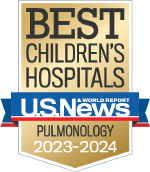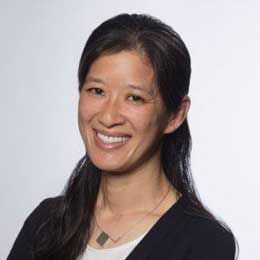Childhood Interstitial Lung Disease
What is interstitial lung disease?
Interstitial lung disease (ILD) is a general term for a group of rare lung disorders that make it hard to breathe. Many of these diseases can be difficult to diagnose and manage, and they can affect people at any age.
Lucile Packard Children’s Hospital Stanford has more pediatric pulmonary specialists in one center than any other hospital in California, and we have expertise in diagnosing and treating patients from infancy through adulthood with any lung condition. We’re proud to be the highest-ranked pediatric pulmonology center on the West Coast, according to U.S. News & World Report.
Diagnosing these rare disorders correctly and quickly is critical, and our team of experts has access to a full suite of diagnostic tools, including advanced imaging, infant pulmonary function testing, cardiopulmonary exercise testing, and comprehensive pulmonary function testing, including spirometry. Our team of pediatric pulmonologists, pathologists, radiologists, and nutritionists work together to develop a personalized care plan for your child.
Our hospital is an affiliate of the Children’s Interstitial and Diffuse Lung Disease Research Network (chILDRN), which means our doctors and researchers can collaborate with their peers across the country to find better ways to diagnose and treat these diseases. We have a growing research team of doctors with expertise in the specific disorders that give rise to childhood rare lung diseases. For example, Christin Kuo, MD, is an international expert in neuroendocrine cells, a specialized cell type that is abnormally increased in neuroendocrine hyperplasia of infancy (NEHI). She is studying how these rare cells develop and function with the goal of improving treatment and management of this disorder and other lung diseases with abnormal neuroendocrine cell function.
Conditions we treat
At Stanford Medicine Children’s Health, our team of pediatric pulmonologists has experience treating many diffuse and interstitial lung diseases, including:
- Diffuse developmental disorders
- Acinar dysplasia
- Congenital alveolar dysplasia
- Alveolar capillary dysplasia with misalignment of pulmonary veins
- Lung growth/developmental disorders
- Pulmonary hypoplasia
- Neuroendocrine hyperplasia of infancy (NEHI)
- Pulmonary interstitial glycogenosis (PIG)
- Surfactant dysfunction disorders
- Genetic disorders of surfactant-associated genes (SFTPB, SFTPC, ABCA3)
- Pulmonary alveolar proteinosis
- Chronic pneumonitis of infancy
- Disorders related to systemic disease processes
- Systemic lupus erythematosus
- Polymyositis
- Sarcoidosis
- Dermatomyositis
- Systemic sclerosis
- Systemic juvenile idiopathic arthritis
- Interstitial pneumonia with autoimmune features
- Disorders of the immune-compromised host
- Opportunistic infections
- Graft-versus-host disease after stem cell transplant, bronchiolitis obliterans
Treatment options
Treatment options depend on the diagnosis. Most diffuse and interstitial lung diseases do not yet have a cure. However, many of these conditions can be successfully managed with supplemental oxygen and careful nutrition monitoring, allowing your child to live an otherwise healthy and active life.
Some rare lung diseases may require a lung transplant, and those patients are in the best hands at Lucile Packard Children’s Hospital Stanford. Our Pediatric Transplant Center is the only pediatric lung transplant program on the West Coast.
For referring providers: refer a patient
Childhood interstitial lung disease comes in many different forms, and its signs and symptoms may vary widely. Because symptoms are nonspecific, initial evaluation should exclude more common causes of presenting signs and symptoms, such as aspiration, sinusitis, cystic fibrosis, pulmonary infection and structural airway abnormalities. Possible indications for referral include:
- Tachypnea of unclear etiology
- Chronic cough
- Persistent wheezing that is not responsive to medications
- Crackles on auscultation
- Hypoxemia
- Failure to thrive
- Abnormal chest x-rays or CT scans
For more information or to refer a patient, please call (844) 709-0957.






Connect with us:
Download our App: